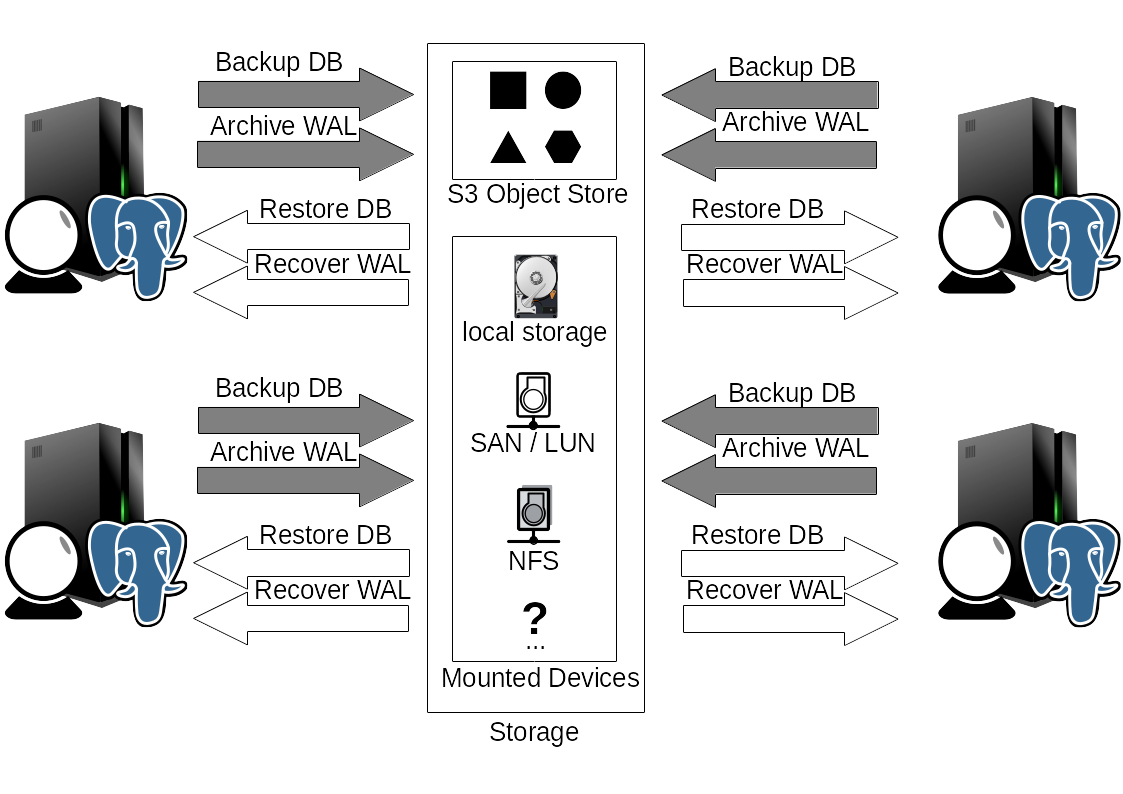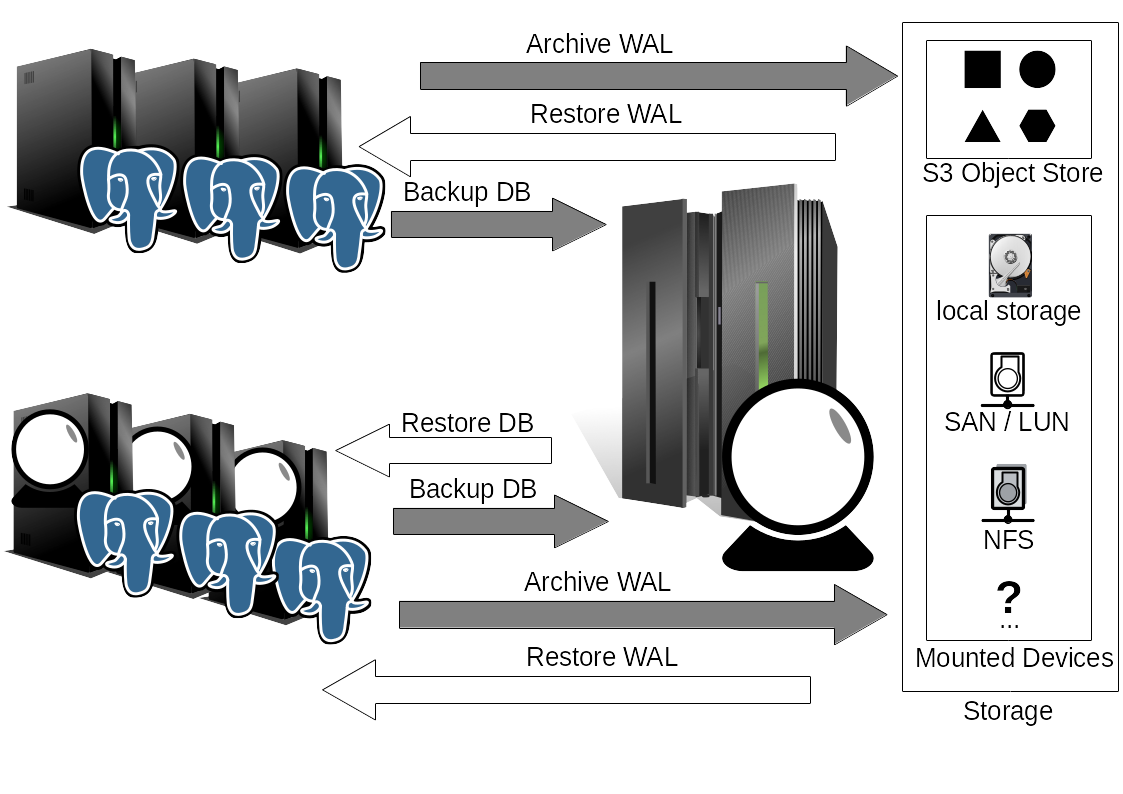This is a personal work-in-progress project! Do not expect anything to work as intended, yet!
Feel free to send bug reports, use --debug! :)
This should become an easy to use (backup) tool for PostgreSQL.
The tool should have an easy to use CLI (like git / docker) and can also be automated easy as well.
The configuration should be easy to use and manage.
Comes with a simple self setup.
Can be used to archive to:
- local storage / network mounts
- S3 / minio
This is a distributed or single node approach, it is the intended use case for pgGlaskugel. On every database server there is also an instance of pgGlaskugel.
Local storage or network mounts are accessed through the local file system. S3 compatible object storage can be accessed by pgGlaskugel directly.
Backups are done by calling pgGlaskugel basebackup. This can happen manually, via cronjob or an automation tool like Ansible.
If WAL Archiving should be used, PostgreSQL's archive_command is set to pgGlaskugel archive %p so that PostgreSQL calls it for every ready WAL file.
Retention policy is enforced by calling pgGlaskugel cleanup --retain <NUMBER OF BACKUPS TO KEEP> --force-retain.
This is normally done via cronjob on the same machine (but there are also other methods).
Backups are restored by a local call to pgGlaskugel restore --backup <BACKUP NAME> --restore-to <PATH TO NEW INSTANCE>
This example uses a central backup server that manages the backups of many database servers. This is not the intended use so this kind of setup is not as convenient.
Backups are called via cronjob or another tool according to schedule. For every server to backup there is a different config file.
pgglaskugel --config server_to_backup.yml basebackupOrchestration will maybe integrated later.
If WAL Archiving should be used, PostgreSQL's archive_command is set to pgGlaskugel archive %p so that PostgreSQL calls it for every ready WAL file.
Because WAL is pushed by PostgreSQL, access to the WAL storage from database server is necessary.
If pgGlaskugel should not be installed, the WAL segments can be compressed and transferred by other methods.
A tool that helps you to manage your PostgreSQL backups.
__________
/ \
/ ______ \
/ / 0\ \
/ / \ \
\ \ / /
\ \______/ /
\ /______\ /
\__________/
Usage:
pgglaskugel [command]
Available Commands:
archive Archives given WAL file(s)
basebackup Creates a new basebackup from the database
cleanup Deletes backups and WAL files enforcing an retention policy
fetch Fetches a given WAL file
genman Generate man page for pgGlaskugel
help Help about any command
ls Shows existing backups
lswal Show all WAL files in archive
restore Restore an existing backup to a given location
setup Setup PostgreSQL and needed directories.
tutor A small tutorial to demonstrate the usage
version Shows the version of pgGlaskugel you are using
Flags:
--archive_to string WAL destination (file|s3) (default "file")
--archivedir string Dir where the backups should be stored (default "/var/lib/postgresql/backup/pgglaskugel")
--backup_to string Backup destination (file|s3) (default "file")
--cluster_name string Name of the cluster, used in backup name (default "ohm")
--config string Config file
--connection string Connection string to connect to the database (default "host=/var/run/postgresql user=postgres dbname=postgres")
--cpuprofile string Write cpu profile to given filename
--debug Enable debug mode to increase verbosity
--encrypt Enable encryption for S3 and/or file storage
-h, --help help for pgglaskugel
--http_pprof Start net/http/pprof profiler
-j, --jobs int The number of jobs to run parallel, default depends on cores (default 12)
--json Generate output as JSON
--memprofile string Write memory profile to given filename
--no_tool_check Do not check the used tools
--path_to_basebackup string Path to the basebackup command (default "/usr/bin/pg_basebackup")
--path_to_gpg string Path to the gpg command (default "/usr/bin/gpg")
--path_to_tar string Path to the tar command (default "/bin/tar")
--path_to_zstd string Path to the zstd command (default "/usr/bin/zstd")
--path_to_zstdcat string Path to the zstdcat command (default "/usr/bin/zstdcat")
-D, --pgdata string Base directory of your PostgreSQL instance aka. pg_data (default "$PGDATA")
--pgdata-auto Try to find pgdata if not set correctly (via SQL) (default true)
--pidpath string path and name for the pidfile (default "/var/tmp/pgglaskugel/pgglaskugel.pid")
--recipient stringArray The recipient for PGP encryption (key identifier) (default [pgglaskugel])
--s3_access_key string access_key (default "TUMO1VCSJF7R2LC39A24")
--s3_bucket_backup string Bucket name for base backups (default "pgglaskugel-basebackup")
--s3_bucket_wal string Bucket name for WAL files (default "pgglaskugel-wal")
--s3_endpoint string S3 endpoint (default "127.0.0.1:9000")
--s3_location string S3 datacenter location (default "us-east-1")
--s3_metadata Enable sending metadada like file type, needed for compatibility (default true)
--s3_part_size_mb int If a part size is needed this will be used, size in MB, min: 5 MB (default 64)
--s3_protocol_version int Version of the S3 protocol version (2,4,-1=auto) (default -1)
--s3_secret_key string secret_key (default "yOzp7WVWOs9mFeqATXmcQQ5crv4IQtQUv1ArzdYC")
--s3_ssl If SSL (TLS) should be used for S3 (default true)
Use "pgglaskugel [command] --help" for more information about a command.
Encryption is delegated to GnuPG
# generate keys
gpg --gen-key
Binaries are created by circleci for EVERY commit, expect them to be broken!
- Binary only pgglaskugel
- Compressed pgGlaskugel.tar.xz
Have a look at https://golang.org/doc/code.html
Setup go build environment.
# install Go >= 1.8
mkdir $HOME/work
export GOPATH=$HOME/work
export PATH=$PATH:$GOPATH/bin
Install pgglaskugel.
go get -u github.com/xxorde/pgglaskugel
go install github.com/xxorde/pgglaskugel
To build with defined dependency versions
make
- GnuPG
- PostgreSQL
- zstandart
Example install for Debian:
sudo apt install gpg postgresql zstd
Example install for CentOS7:
sudo yum -y install epel-release
sudo yum -y install zstd gpg


